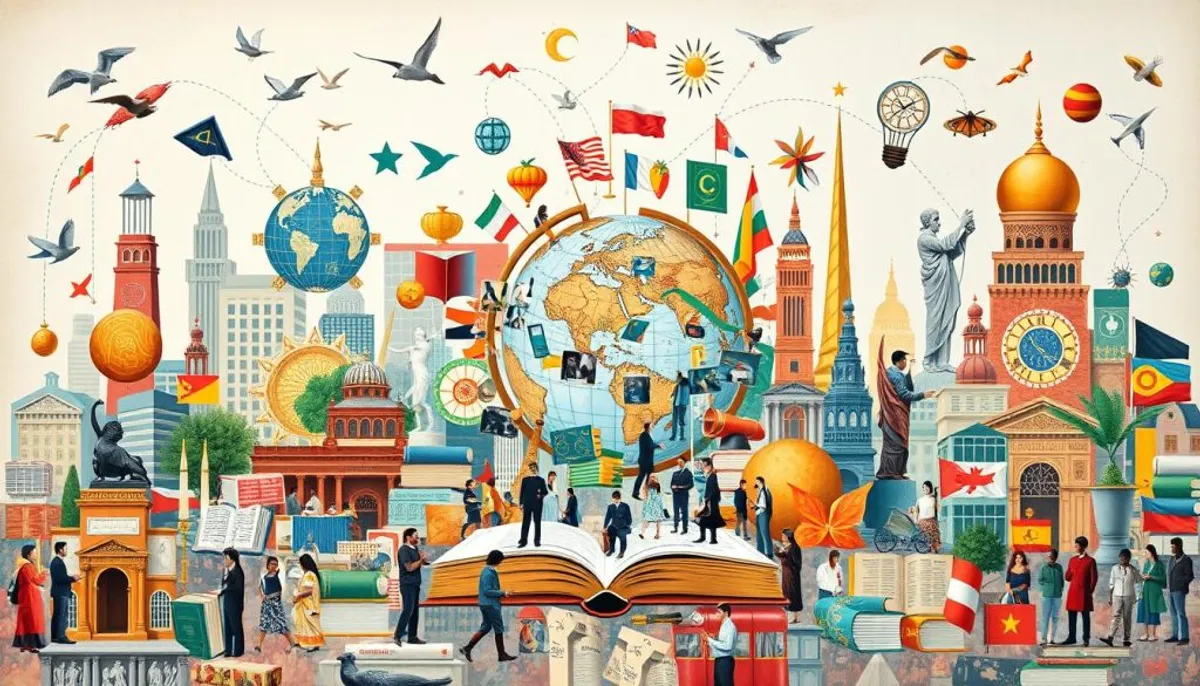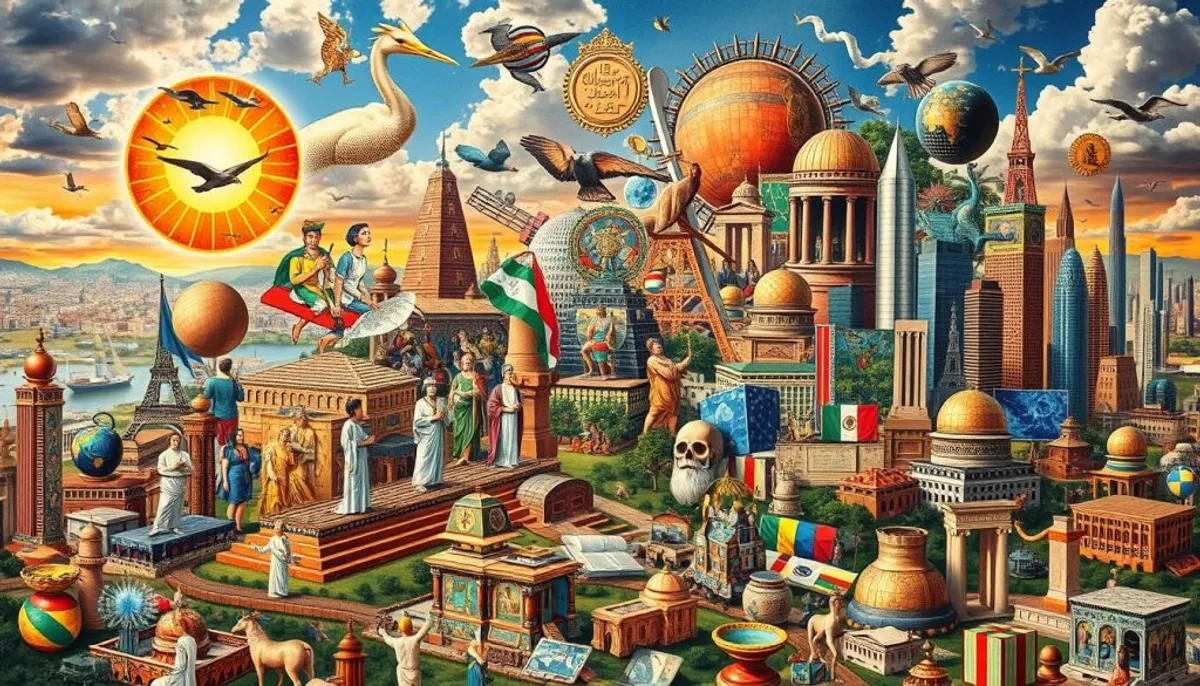The general culture, a vast set of knowledge, is essential in our society. It covers a variety of fields, from philosophy to history, including the sciences. This intellectual wealth shapes our understanding of the world and influences our daily lives.
In the French educational context, Sciences Po emphasizes a nineteenth-century culture. This approach prioritizes the humanities and social sciences. This contrasts with Silicon Valley, where engineering is often favored over the humanities. However, universities like Stanford highlight the importance of linking humanistic knowledge to the professional world.

The general culture is a major asset for personal and professional development. It promotes social adaptation and shapes informed citizens. Indeed, 93% of respondents highlight its key role in developing critical thinking. Moreover, individuals with a good general culture are 67% more likely to be politically and socially engaged.
The digital age has transformed access to knowledge, making information more accessible than ever. The internet has revolutionized our relationship with information, although it poses new challenges. It is essential to know how to navigate this mass of information to make the most of it and enrich one's general culture.
What is the importance of general culture?
General culture is essential in our contemporary society. It influences personal development, career, and social cohesion. Let's look at the key aspects of its importance.
An indispensable personal development
General culture is crucial for personal development. It offers multiple learning opportunities:
- Museums often offer free entry to young people under 26
- Mobile apps allow staying updated on current events
- Students benefit from reduced rates for cinemas
- Conferences and online courses cover various cultural themes
A major professional asset
In the professional world, general culture is an invaluable asset. It facilitates adaptation and decision-making. Companies value the ability to think critically and connect knowledge. Cultural enrichment is crucial for advancing in one's career and maintaining a positive image.
A vector for social development
Socially, general culture fosters exchanges and mutual understanding. It contributes to social cohesion by enabling a better understanding of the world, and cultural enrichment is a key element in this process. Parents play an essential role in transmitting cultural knowledge from an early age.
| Field | Impact of general culture |
|---|---|
| Personal | Development of intelligence and critical thinking |
| Professional | Better adaptation and decision-making |
| Social | Facilitation of exchanges and mutual understanding |
The foundations of modern general culture
The evolution of general culture is fascinating, spanning from ancient Greece to our digital age. This concept has evolved to meet the demands of each era. It reflects the profound transformations of our society and our learning methods.
From the honest man to the digital age
The transition from the honest man of the 17th century to the educated citizen today is significant. This transition illustrates major changes in our society and our sources of information. The internet and modern technologies have revolutionized access to information, offering new ways to learn.
The evolution of the concept of general culture
General culture, once reserved for the elite, has become democratized. In 1925, only 5% of a generation obtained the baccalaureate in France. Today, it is crucial for education and equal opportunities. However, debates continue about its role in a world focused on economic efficiency.

Contemporary sources of knowledge
In the digital age, access to information has multiplied. The internet offers limitless access, but raises questions about the reliability of knowledge. The current challenge is to navigate this abundance of information while cultivating a critical mind.
| Era | Ideal of general culture | Main source of knowledge |
|---|---|---|
| Ancient Greece | The literate | Philosophy and rhetoric |
| 17th century | The honest man | Literature and arts |
| Modern era | The educated citizen | Formal education |
| Digital age | The connected individual | Internet and digital media |
The role of general culture in education
Education is fundamental for the development of students' general culture. The French school system places great emphasis on this aspect. This is particularly true in economic and commercial preparatory classes.
The implemented pedagogy encourages a critical and analytical approach. Literature and philosophy teachers work together to provide a comprehensive general culture program. This approach allows students to acquire diverse knowledge and develop their thinking skills.
The general culture curriculum in preparatory classes lasts two years. A specific theme is chosen for the second year by a commission composed of various educational stakeholders. This theme, which highlights the importance of general culture, is published in the Official Bulletin, usually in April or May.
The Grandes Écoles offer quality subjects for entrance exams. This emphasizes the importance of general culture in higher education. This discipline prepares students to develop a strong intellectual, professional, and social stance.
Learning general culture in the school framework promotes equal opportunities. Indeed, 78% of individuals with a high level of general culture instinctively check the information received. This skill is essential in our information society.
General culture in the digital age
The advent of digital culture has transformed our relationship with information and knowledge. Access to information is easier than ever. However, this raises unprecedented technological challenges.
The challenges of accessing information
In the digital age, the amount of available information is immense. This abundance raises issues of reliability and relevance. Louis Derrac, a consultant and trainer, offers a free course on digital culture. It aims to help navigate this ocean of information.
Louis Derrac's course addresses the challenges of digital technology in education and the state of the art in digital. It is designed to shed light on these complex subjects.
Internet: opportunity or threat?
Internet offers unprecedented opportunities for learning and sharing knowledge. However, it poses risks to privacy. A study reveals that 35% of data sent to Google from a stationary Android phone includes location information.
This reality underscores the importance of a solid digital culture to protect one's privacy. It highlights the need to understand the risks associated with using the internet.

The importance of memorization
In a world where information is at our fingertips, memorization remains crucial. The Villani report on artificial intelligence emphasizes the need for continuous training. This is particularly relevant for older generations.
Memorizing knowledge allows for critical thinking in the face of technological challenges. It also helps maintain independence from digital giants while avoiding the pitfalls of online controversy.
Thus, general culture in the digital age requires a balance. One must leverage new technologies while developing traditional skills. Memorization and critical analysis are essential for navigating this ever-evolving world.
The societal stakes of general culture
General culture is a fundamental pillar of our society, significantly influencing societal issues. It plays a decisive role in equal opportunities, citizenship, and social cohesion. Its impact is deeply felt in our collective life.
A factor for equal opportunities
General culture acts as a powerful lever for equal opportunities. It allows everyone to rise socially and professionally, regardless of their background. The cultural sector, which represents 2.2% of the French economy, offers considerable opportunities thanks to a solid general culture.
A pillar of citizenship
General culture is crucial for informed citizenship. It enables individuals to understand societal issues and actively participate in democratic life. Public service competitions in France highlight the importance of general culture, underscoring its role in shaping engaged citizens.
A vector for social cohesion
General culture fosters dialogue between different cultures and generations, strengthening social cohesion. It helps overcome digital divides and reduce inequalities in access to information. 15% of employers in the Social and Solidarity Economy sector are linked to culture, illustrating its importance in the social fabric.
| Aspect | Impact on society |
|---|---|
| Equal opportunities | Facilitates social and professional ascent |
| Citizenship | Encourages informed democratic participation |
| Social cohesion | Promotes intercultural and intergenerational dialogue |
Conclusion
General culture remains a fundamental pillar in our knowledge society. Its importance is growing, reflected in education. Schools are increasingly adopting general culture tests, highlighting its crucial role in higher education.
It is becoming a major asset for professional futures. Students stand out with well-reasoned and in-depth responses. In a constantly evolving world, general culture offers keys to understanding and analyzing our complex environment.
Finally, general culture plays an essential role in social cohesion. It promotes cultural diversity and gathering. In the face of the challenges of the digital age, cultivating and transmitting this knowledge remains paramount. It shapes informed citizens capable of fully contributing to our society.
RelatedRelated articles


